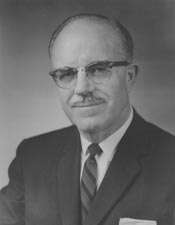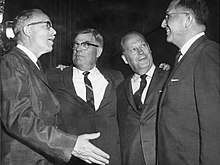Ellis Yarnal Berry
Ellis Yarnal Berry (October 6, 1902 – April 1, 1999) was an American attorney, newspaper publisher and politician, elected to the United States House of Representatives from South Dakota.
Ellis Yarnal Berry | |
|---|---|
 | |
| Member of the U.S. House of Representatives from South Dakota's 2nd district | |
| In office January 3, 1951 – January 3, 1971 | |
| Preceded by | Francis H. Case |
| Succeeded by | James Abourezk |
| Member of the South Dakota Senate | |
| In office 1938-1942 | |
| Personal details | |
| Born | October 6, 1902 Larchwood, Iowa |
| Died | April 1, 1999 (aged 96) Rapid City, South Dakota |
| Political party | Republican |
| Alma mater | Morningside College University of South Dakota School of Law |
Early life and education
Berry was born in Larchwood, Iowa, and graduated from Philip High School in Philip, South Dakota.
He was a student at Morningside College from 1920 through 1922. He transferred to the University of South Dakota, where he completed his undergraduate work and studied law, graduating with a law degree in 1927. He was admitted to the bar that same year under diploma privilege.
Career

L-R: Ellis Y. Berry, Joseph H. Bottum, Karl E. Mundt, and Ben Reifel.
Berry started his law practice in Kennebec, South Dakota; two years later, he moved to McLaughlin. He was elected as state's attorney, probate court judge for Corson County, and mayor of McLaughlin. He served as the publisher of the newspaper Mclaughlin Messenger beginning in 1938. He was editor of the State Bar Association Journal from 1938 through 1950.
Politics
Berry was elected to the South Dakota State Senate from 1938 through 1942, a total of two terms.
In 1950, Berry was elected as a Republican to the United States House of Representatives, and reelected nine consecutive times, retiring in 1971. Beginning in 1952, he also published the McIntosh News and Morristown World.
In 1966, journalist Drew Pearson reported that Berry was one of a group of Congressman who had received the "Statesman of the Republic" award from Liberty Lobby for his "right-wing activities".[1] Berry voted in favor of the Civil Rights Acts of 1957,[2] 1960,[3] and 1968,[4] and the Voting Rights Act of 1965,[5] but voted against the Civil Rights Act of 1964 and 24th Amendment to the U.S. Constitution.[6][7]
After retiring from Congress, Berry he settled in Rapid City, South Dakota. He lived there until his death in 1999.
Legacy and honors
- After retiring from Congress in 1971, he donated his papers to Black Hills State University. The Berry Collection is housed at the E. Y. Berry Library-Learning Center of Black Hills State University and consists of more than 500 boxes of manuscript materials.
- BHSU's Library-Learning Center is named for Congressman Berry.
References
- Pearson, Drew (November 2, 1966). "Judge Rules Against Liberty Lobby". The Free Lance-Star. Fredericksburg, Virginia. p. 6. Retrieved December 14, 2014.
- "HR 6127. CIVIL RIGHTS ACT OF 1957". GovTrack.us.
- "HR 8601. PASSAGE".
- "TO PASS H.R. 2516, A BILL TO ESTABLISH PENALTIES FOR INTERFERENCE WITH CIVIL RIGHTS. INTERFERENCE WITH A PERSON ENGAGED IN ONE OF THE 8 ACTIVITIES PROTECTED UNDER THIS BILL MUST BE RACIALLY MOTIVATED TO INCUR THE BILL'S PENALTIES".
- "TO PASS H.R. 6400, THE 1965 VOTING RIGHTS ACT".
- "H.R. 7152. PASSAGE".
- "S.J. RES. 29. CONSTITUTIONAL AMENDMENT TO BAN THE USE OF POLL TAX AS A REQUIREMENT FOR VOTING IN FEDERAL ELECTIONS". GovTrack.us.
External links
- United States Congress. "Ellis Yarnal Berry (id: B000416)". Biographical Directory of the United States Congress.
| U.S. House of Representatives | ||
|---|---|---|
| Preceded by Francis H. Case |
Member of the U.S. House of Representatives from South Dakota's 2nd congressional district 1951–1971 |
Succeeded by James Abourezk |
| Honorary titles | ||
| Preceded by Jennings Randolph |
Oldest Living United States Representative (Sitting or Former) May 8, 1998 – April 1, 1999 |
Succeeded by Mike Mansfield |
